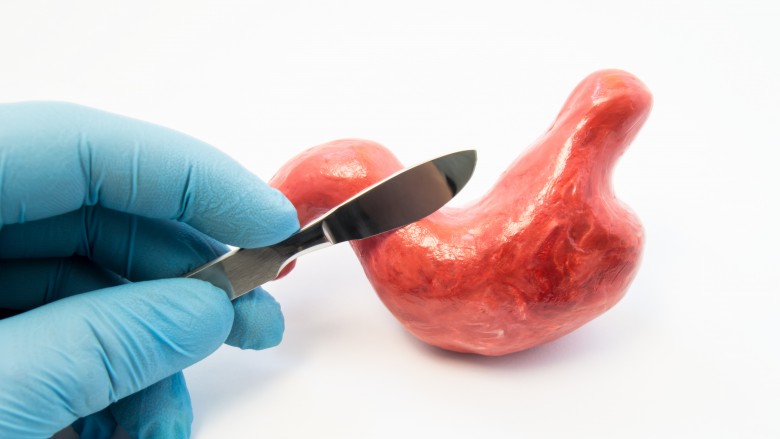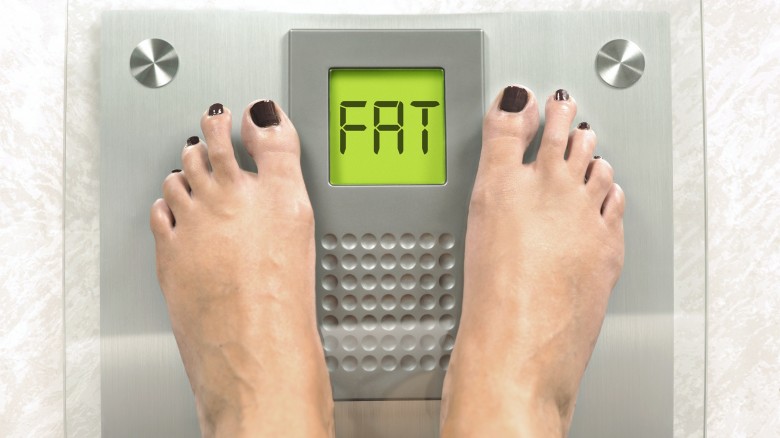Things You Didn't Know About Weight Loss Surgery
Weight loss surgery seemed like a magical solution to shedding unwanted pounds until I witnessed my mom go through the lengthy and difficult process in 2010. My perception of what weight loss surgery was and how it affected those who had the procedure done was based on reality television shows like My 600-lb Life, and the vague understanding I had of what the surgery actually entailed. I thought, "Your stomach gets smaller, you eat less, and 'Voilà!' you're skinny!" Little did I know this idea was simplistic and false.
The stigma of obesity can follow someone, even as they enter into the process of getting weight loss surgery, because of perceptions similar to my own. Delving into what people have to do in order to get weight loss surgery and the impact it has on their lives might give people a better understanding of the difficulties and effort it takes to lose weight using drastic methods — and to help inform those considering this path for themselves.
What exactly is weight loss surgery?
First, you should note there is more than one kind of weight loss surgery: gastric sleeve, gastric bypass, gastric banding, duodenal switch, vBloc therapy, and gastric balloons. Two of the more commonly known procedures are gastric bypass, and gastric banding.
Dr. Moses Shieh, surgeon at the Surgical Healing Arts Center, in Naples-Fort Myers, Florida defines gastric bypass as, "a surgical procedure that divides the stomach into a small upper section and larger lower section, and redirects the absorption of calories and nutrients. This will cause you to eat less and absorb fewer calories."
Gastric banding, on the other hand, he says, "uses a silicone band that is wrapped around the upper stomach to restrict how much food it can hold. Since no part of the stomach or intestine is cut or removed, the band is considered to be the least severe of the types of bariatric surgeries."
An "easy way out"
People often think weight loss surgery is the "easy way out," or quick fix. However, any time major surgery is involved in an attempt to improve someone's health or quality of life, it should not be likely not taken lightly. Prior to having this surgery, my mom struggled with her weight. Being overweight damaged her knees and continues to cause her pain to this day. "I was heavy, so the doctor was always telling me I needed to diet and exercise to lose weight," she said. "Even if I dieted, I had a really hard time exercising because of my knee pain. Physical activity that put pressure on my knees for an extended period of time was out of the question, and I couldn't do lower impact workouts like swimming, because I don't know how to swim. I felt very stuck."
My mom's difficulty with working out due to the knee issues is one of the reasons her doctor strongly suggested she consider gastric bypass surgery. She said that while she was nervous about the idea of a gastric bypass, doing it was an easy decision — but it still wasn't a decision she made lightly.
Getting approved isn't easy
Once you've made the decision to go ahead with weight loss surgery, it's time to clear another hurdle — actually being approved for surgery. Dr. Shieh says there is an extensive screening process associated with surgery. First, "a team of health professionals must determine if you are medically and mentally prepared, and if you are motivated enough to change your diet and lifestyle. They do this by arranging a diet program, schedule pre-consultations, and may require you to participate in additional educational meetings."
For example, before my mom's surgery, she had to attend counseling sessions where she spoke about her reasons for wanting a gastric bypass. She was also prescribed a high-protein shake, meant to aid her in pre-surgery weight loss. Dr. Shieh says losing weight before surgery can be required, because it "shrinks the size of the liver, and improves safety and access for your surgeon." My mom was able to lose 10 pounds in two weeks, clearing her for surgery, but the protein shakes gave her bad breath and dry mouth — not to mention they tasted awful.
Weight loss surgery isn't for everyone
Though it's definitely possible to lose weight the old-fashioned way, with strict lifestyle changes, Dr. Shieh notes, "It can be very difficult to lose large amounts of weight without surgery." This is why he says it's important to keep in mind that weight loss surgery is a "major, life-changing decision that should not be taken lightly."
Unfortunately, even if it's something you really want, weight loss surgery may not be right for you. Your doctor's decision about whether or not you should get weight loss surgery will depend on many different factors.
Los Angeles plastic surgeon Dr. Elliot Hirsch says that in general, "Patients who have a body mass index (BMI) over 40 are candidates. If the body mass index is between 35-40 and they have health problems caused by their weight, they may be candidates as well." He also says that despite a patient's desire to get the surgery and their current BMI, "If someone is not stable medically for surgery, such as if they have untreated coronary artery disease, they would not qualify for the procedure until they are medically cleared."
There are risks
Just like any surgery, you should know there are risks to procedures like gastric bypass and gastric banding. According to the Bariatric Surgery Source, the list of potential issues and complications from gastric bypass and gastric banding can include things like abdominal hernia, abscess, blood clots, bowel obstruction, deep vein thrombosis, gastro-intestinal leaks, and complications from general anesthesia. But don't panic, or at least, try not to — bariatric surgeries have a 0.1 percent mortality rate, only 7 percent of patients have complications, and not all complications are serious or life-threatening. Also, if you're in the process of having any kind of weight loss surgery, rest assured that your doctors and surgeons will go through any and all complications with you. And if you're unsure about anything, or you have concerns — ask!
Weight loss surgeries aren't always effective
So let's say you've had the surgery. The assumption might be that from here, it's smooth and the pounds just melt away. While doctors agree that weight loss surgery is an incredible tool, it doesn't mean that you're going to lose all of the weight you want. Dr. Shieh says on average, patients who undergo gastric bypass are expected to lose about 75 percent of their excess weight, and patients who undergo gastric banding are expected to lose about 50 percent of their excess weight. However, he says that this isn't a guarantee. "Weight loss, whether or not it is surgically-assisted, differs from person-to-person."
My mom recalled the session moderator from her pre-surgery group sessions, "He was a really large man and quite overweight. I was always curious why someone who made a living talking to people about how much gastric bypass could change their life wouldn't try it themselves." After several weeks and multiple sessions, her curiosity got the best of her, so she asked. His answer, according to her, is what made her committed to doing everything she could to make the surgery a success. "He told me, 'Actually, I've already had the surgery.' I was shocked. It's like he knew what my next question was, so he said, 'I loved being slim, but I love food more. I managed to stretch my stomach and go back to the way I used to eat.' It was definitely an eye-opener."
Even with a tiny stomach pouch created through a gastric bypass, Dr. Shieh says, "After surgery, you can stretch your stomach if you overeat and do not follow your diet regimen."
Losing the weight
Weight loss surgeries work by restricting how much food your stomach can hold at any time. Dr. Shieh says, "After surgery, patients simply can't consume enough calories to keep their weight up, and the little food they are able to eat leaves them feeling full for a lot longer, so they tend to eat less frequently."
It's important to follow your doctor's advice to make sure you're getting the nutrients you need — and not undoing any of your progress in the process.
Life, post surgery
After my mom underwent gastric bypass, there was a long adjustment period, which included the drastic change in her diet. Aside from the initial recovery, she soon discovered, like the doctors told her, that she could experience something called malabsorption. "Malabsorption may discourage you from eating greasy or sugary food," says Nayyar. "Bypassing part of the small intestine prevents some fat from being digested, causing severe diarrhea. Eating food with high sugar content can cause an attack of nausea, gut pain, and diarrhea known as "dumping syndrome."
My mom can't eat certain types of fish, excessively greasy food, and most pasta or noodles. It was not an easy process adjusting to all of these limitations, especially because finding out what foods made her ill was a process of trial and error. "I'm Filipino and we like to eat; I don't have food allergies," she said. "I went from being able to eat whatever I want, to not being able to eat a lot of it at all." When certain foods didn't agree with her new stomach, she almost immediately felt ill and needed to vomit. She vomited a lot during the first year after her surgery. For her, that was the toughest part of the process. "The pain was terrible," she said. "Even if I had just a little bit of food, I felt so full, like my stomach was going to burst. Even now, I can't gulp water. It fills me up too fast, and I throw up."
Her weight loss of over 100 pounds can't just be attributed to the change in her diet, however. She got a membership at the local YMCA shortly after getting the surgery seven years ago. She tries to workout two to three times a week, and does AquaFit group classes to maintain her weight.
Cosmetic surgery
Often, after a patient has undergone weight loss surgery and lost a significant amount of weight at a rapid pace, they may notice that they have excess, loose skin. Some patients will require yet another surgical procedure to remove excess skin after they've lost all of the weight.
After losing over 100 pounds, my mom noticed some loose skin that didn't go away, even over time, after regularly exercising. It does bother her to have it sometimes, but she told me she was glad she didn't have to have another procedure done. "Excess skin removal is not necessary, but many patients opt for it for personal reasons," said Dr. Shieh. "Plastic surgery is usually not considered until after a year or two, so we can see how the patient's skin adapts to the weight loss."
Dr. Hirsch said the most common areas of excess skin after massive weight loss are the abdomen, upper arms, and inner thighs. "The skin often has stretch marks and hangs in saggy folds on the body," he says. "Think of it like a balloon, when the patient is obese, the balloon is full. When they lose the weight, the balloon deflates." Cases where surgery to remove loose skin may be required, is if the abdominal wall rubs against the lower abdomen and pubic region. He says that aside from discomfort, "This may lead to rashes, skin irritation, or even fungal infections and chronic wounds. A panniculectomy or abdominoplasty procedure is needed to remove the hanging folds of skin and restore form and function to the abdominal wall."
It's a life-changing decision
When I asked my mom if she would recommend a gastric bypass to anyone who could benefit from one, her answer was, "YES!"
"I was so frustrated with losing weight, and I was so fortunate to be given this chance," she said. "But [people should keep in mind] when you do this, you still have to learn discipline and self-control. I really believe that the surgery has significantly improved my life." She also said having gastric bypass surgery wasn't, and isn't without its challenges. "I still struggle with weight loss, and I make an effort every day to eat healthier and exercise."










